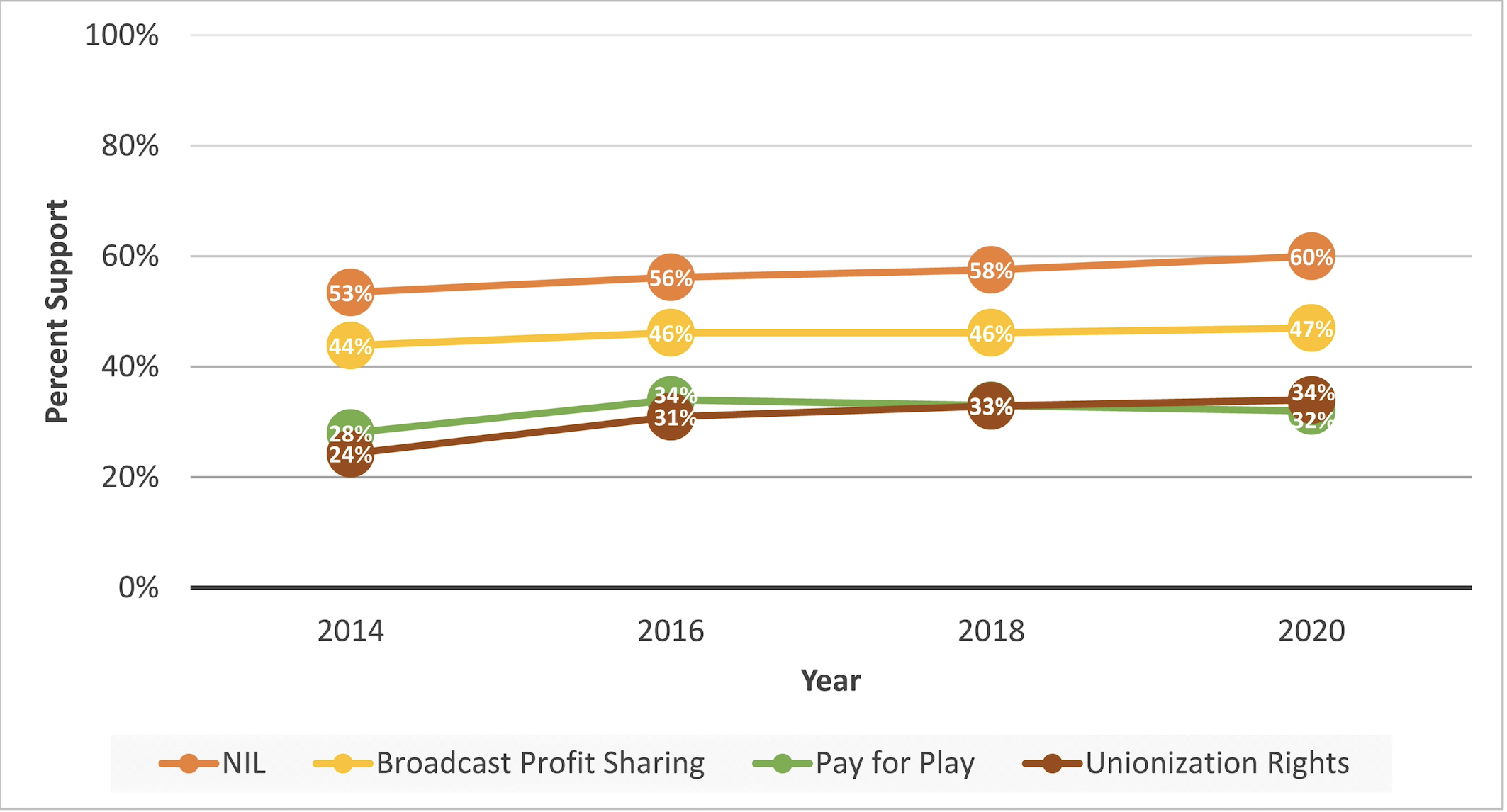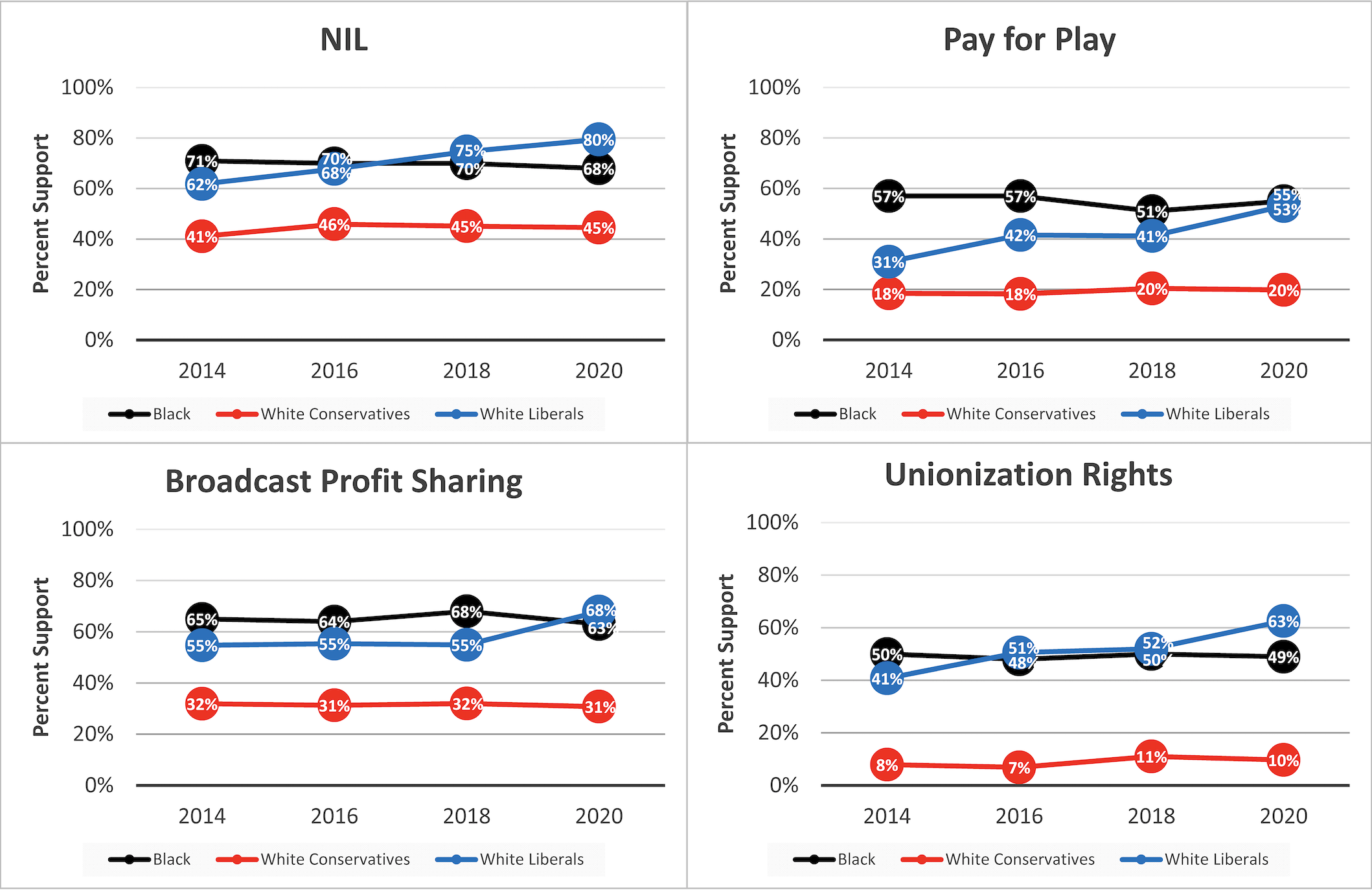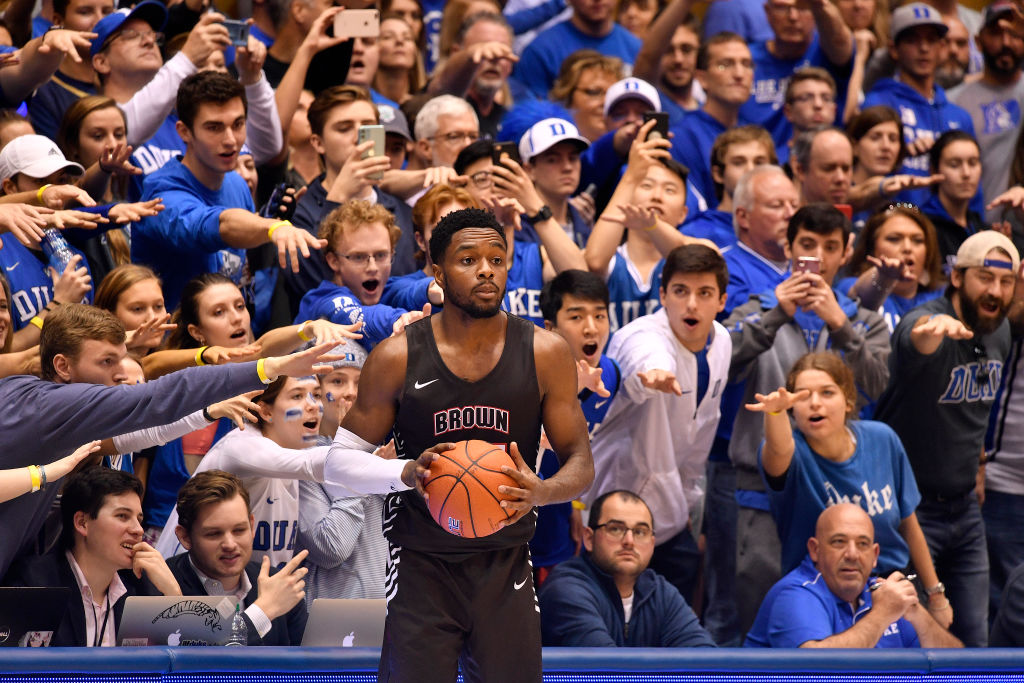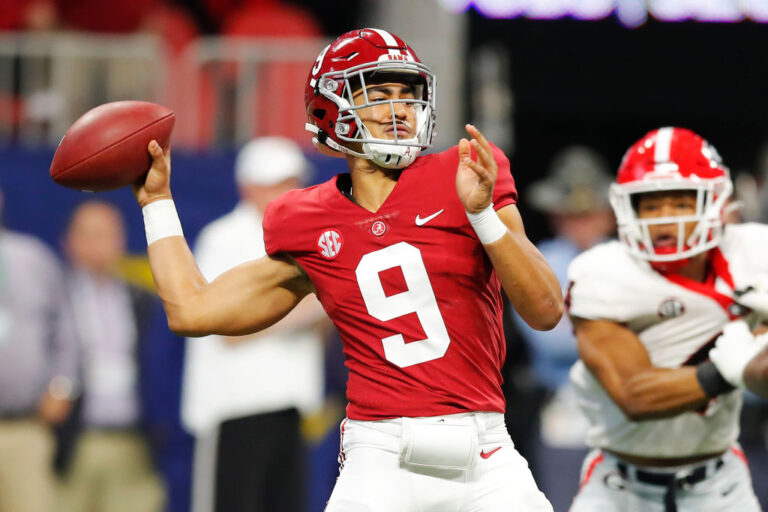White Liberals Are Driving Increased Public Support for NIL and College Athlete Rights
Why this matters
As data rolls in showing public sentiment in the U.S. toward new NCAA name, image, and likeness policy, the driving force of support for the new rules is White liberals’ “out-group preference” and their increased racial sympathy.
The past six years have been an exciting time for those interested in reforming the National Collegiate Athletic Association. Beginning with O’Bannon v. NCAA in 2014 and culminating with the recent Supreme Court decision in NCAA v. Alston, an increasingly vibrant social movement – led by a coalition of past and present college athletes, lawmakers, journalists, and academics – has helped to reshape the landscape of college sports in the United States and the NCAA’s relationship to the athletes under its purview.
While much of this change has been driven by legal battles and legislative action, public opinion concerning the NCAA and college athletes’ financial rights has also played a key role – and almost certainly will continue to do so in the years to come. As we show below, that opinion appears to be following the same trajectory as so much else in American social, political, and cultural life, with significant racial differences in how people understand the issue, and growing polarization among Whites along ideological lines.
For the past six years, we have been tracking how the public thinks about a wide array of issues connected to the NCAA, including financial compensation for college athletes. We’ve discovered that the American public draws clear distinctions between different approaches to reform. How so?
In every one of our surveys, a majority of the public has supported the idea that college athletes should “share in the profits that the NCAA and its member colleges and universities earn from the use of their name, image, or likeness in video games and merchandising.” Somewhat less popular has been the idea that college athletes should “share in the profits that the NCAA and its member colleges and universities earn from the sale of college sports broadcast rights.”
Meanwhile, only one in three Americans typically supported providing a salary to college athletes or allowing them to unionize.

Since 2014, support for all four of the reforms shown above has gradually increased. However, there are differences in support that relate to race. In the aggregate, African Americans are significantly more supportive of NCAA reform than Whites. We believe that this racial divide is a function of perceptions about “who benefits.” Numerous studies of inter-group relations show that people have “deep-seated psychological predispositions that partition the world into in-groups and out-groups – into ‘us’ and ‘them.’” Decades of research on the influence of these group attachments suggests that even the most “minimal” group identities can lead people to exhibit favoritism toward in-group members and bias toward out-group members. Stronger identities, such as race, exert an even stronger influence over opinions.
On average, African Americans in our surveys (as well as Whites) dramatically overestimate the proportion of college athletes that are Black when compared to the actual racial demographics of Division I athletes (48 percent to 21 percent). We suspect that this overestimation, coupled with a strong sense of “linked fate,” leads African Americans to support NCAA reforms because they believe that the benefits will accrue primarily to other members of their in-group. Indeed, when African Americans are subtly encouraged to think about White college athletes as the beneficiaries of NCAA reform instead of relying on their stereotyped view of who will benefit, their support for that reform plummets. In one of our survey’s experiments, African Americans made to think about White college athletes expressed vastly less support (15.2 percent) for “pay for play” than those made to think about Black college athletes (31.6 percent).
Whites are less politically monolithic than Blacks, and there are dramatic ideological differences among them: White liberals average levels of support for NCAA reform that are 40 percent higher than those of White conservatives. Importantly, these massive differences in support are not the result of a different set of beliefs about who would benefit from change. White liberals and conservatives converge on their (incorrect) assessment that 46 percent of NCAA athletes are Black.
Instead, we suspect that the ideological gap comes from how the two groups view racial inequality in the U.S. social science research has shown that conservatives are likely to reject structural and historical explanations for disparities between African Americans and are more likely to endorse the idea that racial equality can be achieved if Blacks would “try harder.” They are also skeptical of claims about White privilege and believe that Blacks should “work their way up” without “special favors," all typical survey items used to identify racial attitudes in polling.
By contrast, studies have shown that White liberals think of intergroup disparities in largely structural terms and draw strong links between historical discrimination and contemporary inequality. They also support government and private-sector policies tailored to help African Americans, even if such policies involve discriminating explicitly on the basis of race. In other words, White liberals are racially “sympathetic” toward Blacks in ways that lead them to support policies benefiting African Americans as a group.
Perhaps unsurprisingly given the disproportionate number of African Americans participating in college football and basketball, the attitudes shown above appear to be activated for Whites when asked about policies addressing the financial compensation and collective bargaining rights of NCAA athletes. In our surveys, White liberals with the most racial sympathy overwhelmingly endorse NIL, broadcast profit sharing, pay for play, and unionization rights. White conservatives, who feel less racial sympathy for African Americans, do not.
As a result of these ideological divisions, Whites have historically been less supportive of NCAA reform than African Americans. Unlike African Americans, however, White attitudes have evolved since 2014. White support for NIL, for example, moved from 50 percent in 2014 to 59 percent in 2020. The largest change for Whites was on the question of whether players should be paid a salary—increasing by 3 percentage points in each of our four surveys.
What is fueling this shift? As the figure below demonstrates, all of the change since 2014 is concentrated among White liberals. A majority of White liberals in 2020 endorsed every one of the proposed reforms we asked about in our surveys – and, as a group, White liberals are now as or more supportive of these reforms than African Americans.
Meanwhile, the pattern of support among White conservatives mimics that of African Americans, showing almost no change since 2014.

So what’s going on? The short answer is that White liberals have become far more racially sympathetic since 2014. We are living through an era that journalist Matthew Yglesias has dubbed the “Great Awokening,” in which White liberals are moving so far to the left on issues related to race that they are now the most racially liberal segment of American society, scoring significantly higher than even African Americans on measures of racial liberalism. In one particularly revealing example of this trend, White liberals have become the only major demographic in the United States to display an out-group preference – meaning that they feel more negatively about their own racial group than other racial groups.
The growing racial sympathy of White liberals has led many to start reconsidering their position on NCAA reform (and much else). The increasingly explicit focus on the racial inequities of the current system of college athletics has accelerated this process of reconsideration. To take just one example, California lawmakers passing the state’s version of NIL reform in 2019 explicitly discussed the fact that the coaches and administrators who make money off college athletics tend to be White, while most college athletes playing college football and men’s basketball, the most profitable sports, are African American. Conscious efforts to frame and criticize NCAA policies through the lens of social and racial justice have undoubtedly driven the huge increases we discovered in the attitudes of White liberals.
Looking ahead, recent changes to NIL policies may fundamentally alter the dynamics of public opinion. If White college athletes begin to receive higher-profile and more lucrative deals for use of their NILs, the public’s perceptions of “who benefits” from NCAA reform of all kinds may change. These changes in perception would likely erode the support of African Americans and White liberals, who have favored change primarily because it was assumed to benefit Black college athletes. Alternatively, better NIL deals for African Americans could bolster support among African Americans and white liberals by affirming their assumptions about “who benefits.”
Monthly Issue
NIL & the Future of College Sports
College sports changed dramatically this year with new NCAA rules allowing athletes to profit from their names, images, and likenesses (NILs). For athlete empowerment advocates, it was a major victory—one that could prompt further reform and reorganization across the landscape of intercollegiate athletics.
How has NIL already impacted college sports, and what is on the horizon for campuses and their communities around the United States?



